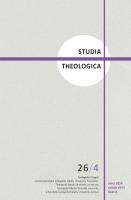Smiech a humor v kresťanstve
Laughter and Humour in Christianity: A Philosophical Reflection
Author(s): Ľuboš RojkaSubject(s): Christian Theology and Religion, Philosophy, History of Philosophy, Ethics / Practical Philosophy, Social Philosophy, Theology and Religion, Psychology of Religion
Published by: Univerzita Palackého v Olomouci
Keywords: Laughter; Humour; Christianity; Philosophical Explorations;
Summary/Abstract: Laughter and humour are integral parts of human life, including Christian life. In antiquity, Greek philosophers like Plato generally condemned laughter, considering it a manifestation of a loss of self control. Similarly, early Christian thinkers, inspired by Plato and the Scriptures, perceived laughter negatively. In contrast, Thomas Aquinas, influenced by Aristotle, attributed a positive role to laughter and humour, highlighting their potential educational function and importance in maintaining a balanced lifestyle. Søren Kierkegaard believed that humour is an essential part of Christian life, marking the transition from the ethical to the religious level of existence. Modern theories of humour point to it as a mechanism for overcoming differences between expectations and reality, which can be useful in Christianity for a deeper understanding of religious truths and thus overcoming misconceptions. Despite its complexity, humour in the Christian context opens up space for a more positive and humane perception of faith.
Journal: Studia theologica
- Issue Year: XXVI/2024
- Issue No: 4
- Page Range: 135-156
- Page Count: 22
- Language: Slovak

